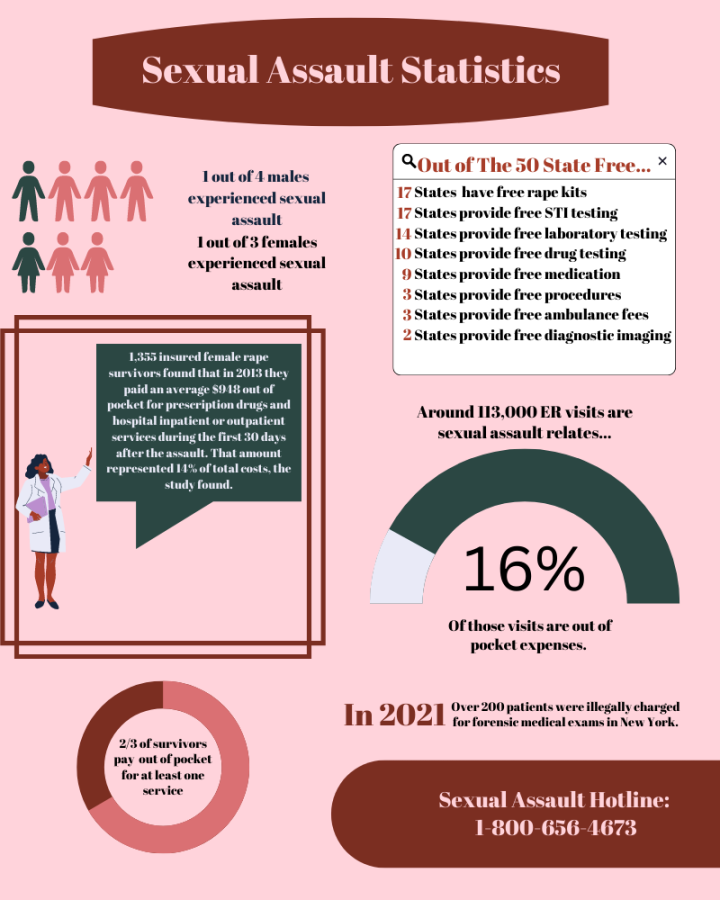Imagine enduring a traumatic experience, getting the help you need, and receiving a giant medical bill in the mail a few weeks later. This is the reality of sexual assault victims, many of whom receive large medical bills for necessary exams and other healthcare expenses.
Although a federal law requires forensic exams to be free, victims can still be charged for out-of-pocket expenses.
The Violence Against Women Act (VAWA) was a federal law put into place in 1994 stipulating that victims cannot be charged for forensic exams performed after sexual assault occurred. This federal law requires patients to be examined and interviewed for physical trauma, penetration, and force to examine the evidence collected. Under this act, a rape kit is covered under instate. Coverage of other tests and treatments is determined state by state.
All 50 states cover the rape kit cost if administered correctly. 17 states will cover pregnancy and STI tests as well. Other expenses that may be covered from state to state include medications, advanced testing, and medical transportation fees.
If states offer coverage, why are so many victims blindsided with bills?
Not all rape kits are free to sexual assault victims is because of how they are being performed. After suffering a traumatic experience and working up the courage to report it, the last thing a victim worries about is how the nurse is performing the exam.
In order to have a rape kit examination covered under federal law, the nurse needs to be a registered Sexual Assault Nurse Examiner (SANE) or Sexual Assault Forensic Examiner (SAFE).
While it may seem like being a SANE should be expected, the reality is a huge shortage of SANE’s and SAFEs worldwide. Many hospitals, especially in rural areas, don’t have one on staff.
Since many hospitals don’t have a SANE on their staff, many victims and patients have to travel far to get covered treatment. In 2016, a report was conducted by Sameul Dickman to try and find rural areas that had a SANE on staff. They found that most had to travel up to two hours to get proper medical help. “I imagine that some patients go to an emergency room that isn’t equipped to offer the forensic exam, and they might be told they need to go somewhere else,” Dickamn reported. Not all hospitals are equipped with how to help a survivor and so many get turned away or get improper care.
Other patients are billed by mistake. Sometimes a nurse or doctor can put in the incorrect diagnostic code, which mistakenly bills a patient. It is important to know what is and what isn’t covered under each state’s protocol, but sometimes it can just be a simple mistake on the hospital’s end.
Sometimes a victim is too scared to report what happened or doesn’t have the money to pay for the medical expenses, so they choose to stay silent. Others speak out but don’t receive any support at all.
Erin, a victim of sexual assault reported her story to the police. They sent her to the nearest hospital to have a rape kit done. She had a SAFE perform the exam, checking for injuries and collecting evidence. “The exam took hours and made her even more miserable. Police never made an arrest. As time passed and the woman tried to move past the assault, she received regular, unwelcome reminders: bills from the hospital and emergency physicians group that treated her.” Erin just wanted to report her story and get examined but instead was left more miserable than before, with no actions made, and a hefty hospital bill to pay for later.
There are so many reasons why sexual assault goes unreported, but the cost of treatment is often overlooked. If victims could get the proper treatment they need and not have to worry about the medical bills setting back their life, many more would be willing to report it and hopefully get the justice they deserve.









